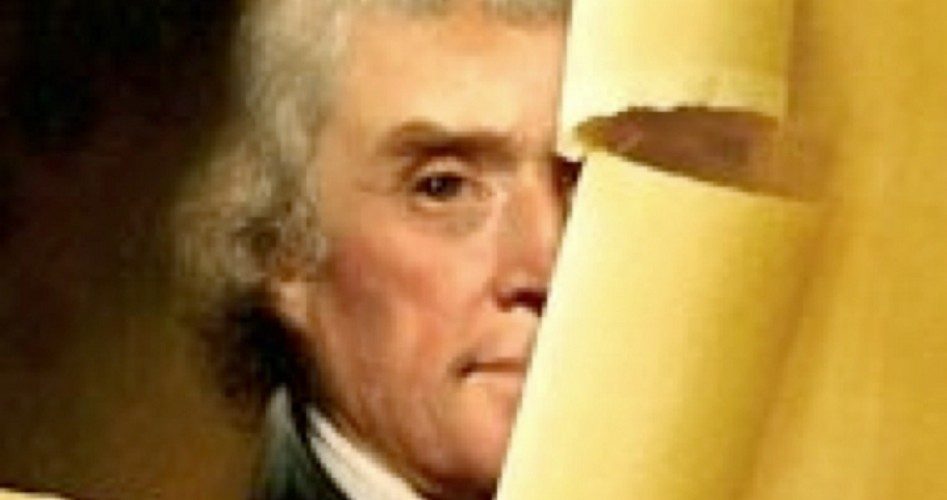
Christian Bible and book publisher Thomas Nelson announced that it has pulled a book by noted conservative historian David Barton on Founding Father Thomas Jefferson for what it claimed were factual issues with the text. According to the Nashville Tennessean newspaper, Barton’s book, The Jefferson Lies, “claims to expose liberal myths about Thomas Jefferson, author of the Declaration of Independence and the nation’s third president.”
The publisher began getting cold feet about the book when some historical scholars challenged its factual authenticity, and “a group of ministers from Cincinnati called on Nelson to cancel the book,” reported the Tennessean.
Casey Francis Harrell, Thomas Nelson’s director of corporate communications for Thomas Nelson, said that after reviewing a number of complaints about the book, the publisher decided to cancel publication. “Because of these deficiencies, we decided that it was in the best interest of our readers to cease its publication and distribution,” said Harrell.
When Thomas Nelson first published The Jefferson Lies, it promoted the book as Barton’s attempt to counter revisionist history and tell the truth about Jefferson. “History books routinely teach that Jefferson was an anti-Christian secularist, rewriting the Bible to his liking, fathering a child with one of his slaves, and little more than another racist, bigoted colonist — but none of those claims are actually true,” declared a Thomas Nelson press release about the book.
One of Barton’s chief antagonists appears to be Dr. Warren Throckmorton, a psychology professor at Grove City College in Pennsylvania, who is more recognizable as a onetime proponent of reparative therapy for homosexuals, but who took time enough to publish a book attacking Barton’s take on Jefferson. Throckmorton claimed to have closely checked Barton’s work on Jefferson and found that what he wrote didn’t match the available research. “We checked all the footnotes [from Barton’s book] and we found they didn’t support what he wrote,” Throckmorton told the Tennessean.
As just one example, “Throckmorton said Barton claims Jefferson was an investor in an early American printing of the Bible, when it turned out that Jefferson only bought one copy,” reported the Tennessean. “He also claimed that Barton downplayed Jefferson’s views on slavery. Throckmorton said that Barton wrote that Jefferson owned more than 200 slaves but said that Virginia laws banned him from freeing those slaves. ‘That’s not true,’ said Throckmorton. ‘Jefferson freed two slaves, one in 1794 and one in 1796. So you can’t say he didn’t free slaves, because he did free two slaves.’”
According to the Tennessean, Barton “said he has documents to back up all the claims in his book. For example, he said that the laws in Jefferson’s times fined any owners who freed slaves and that Jefferson would have freed his slaves if he could have. He said Throckmorton doesn’t understand how complex the laws about freeing slaves were. ‘This is one of the cases where he is just nuts,’ he said.”
Throckmorton also challenges Barton’s claim that Jefferson helped to print an early Bible published in America, claiming that the founder purchased only one copy. On his website, Wallbuilders.com, Barton answers that claim, noting that not only did Jefferson publicly attach his name as a personal endorsement of the publication of the John Thompson Bible, “the largest Bible ever published in America to that time,” but he also noted that “the Thompson Bible was one of many examples I provided to demonstrate occasions where Jefferson helped promote/fund/print the traditional unedited Bible.”
The group of Cincinnati ministers who took exception to Barton’s book included black ministers who were offended about the author’s defense of Jefferson over the issue of slavery. The Rev. Damon Lynch, pastor of the mostly black New Jerusalem Baptist Church in Cincinnati, voiced the predominant complaint when he argued that The Jefferson Lies “glosses over Jefferson’s real record on slaveholding, and minimizes Jefferson’s racist views.” Added Chris Beard, a pastor at Cincinnati’s First Christian Assembly of God church: “We are protesting as concerned believers in the evangelical Christian community, who believe that many are being misled by David Barton’s teachings.”
Not only did the ministers condemn the book, but threatened that they would have stopped purchasing Thomas Nelson books and Bibles had the publisher not bowed to their demands to pull the Barton title. “We love Thomas Nelson,” Lynch said. “My library is filled with Thomas Nelson books and I didn’t want to stop doing business with them.”
According to World Magazine, other historical scholars have expressed concerns over Barton’s work as well. “Glenn Moots of Northwood University wrote that Barton in The Jefferson Lies is so eager to portray Jefferson as sympathetic to Christianity that he misses or omits obvious signs that Jefferson stood outside ‘orthodox, creedal, confessional Christianity,’” reported the magazine. “A second professor, Glenn Sunshine of Central Connecticut State University, said that Barton’s characterization of Jefferson’s religious views is ‘unsupportable.’”
And after evaluating Barton’s popular video America’s Godly Heritage, Gregg Frazer of the Master’s College in California questioned a number of Barton’s claims, such as that 52 of the 55 delegates to America’s constitutional convention were “orthodox, evangelical Christians” — a number Barton claimed he got from author M.E. Bradford’s book A Worthy Company, according to World Magazine.
According to World Magazine, among Barton’s staunch champions are Mike Huckabee, Newt Gingrich, Michele Bachmann, and other neo-conservative leaders. Barton “questions how many of his new critics have actually read his work, especially The Jefferson Lies,” World reported. “Barton concedes that Jefferson doubted some traditional Christian doctrines, but argues that these doubts did not emerge until the last couple of decades of his life. He says that all of his books, including his latest, are fully documented with footnotes, and that critics who look at the original sources he is using often change their minds.”


